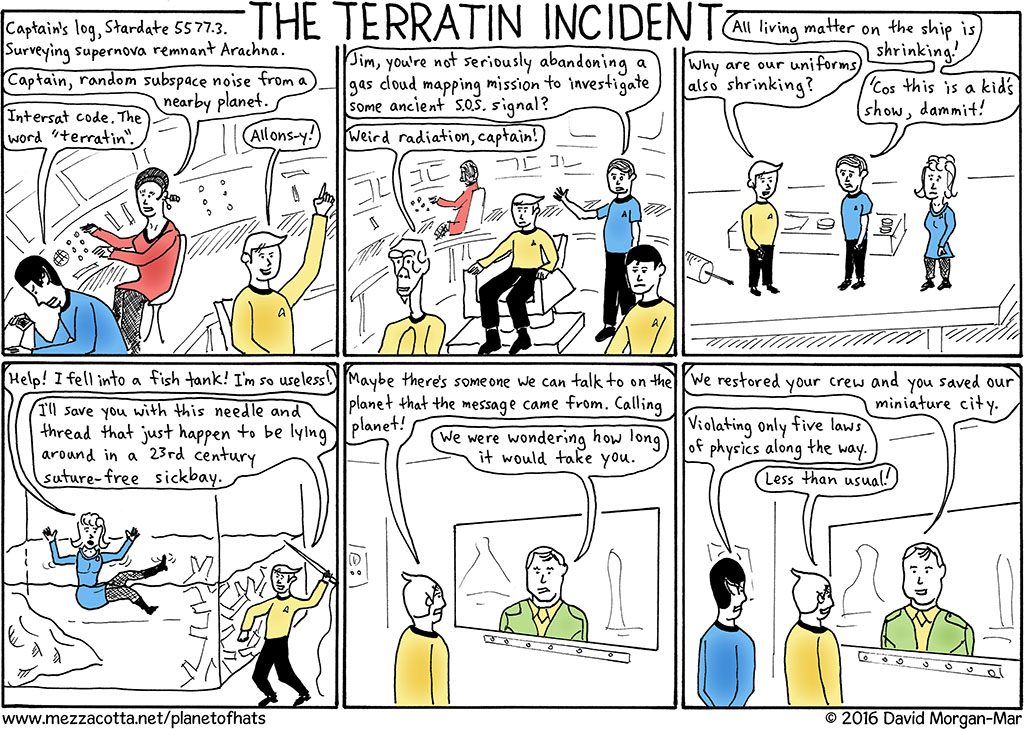Actually, I think Spock under-counted. (I thought of some more when writing up these notes.)
- Coulomb's law. It's stated explicitly in the episode that the method of shrinking is that the space between the atoms is getting smaller. They retain their full number of atoms, and hence mass - it's just the distance between the atoms is shrinking. This violates the electrostatic repulsion between the electron shells of the atoms.
- Newton's law of cooling. Since the mass is the same, and the temperature gradient between the human bodies and their surroundings is the same, the rate of heat loss per unit surface area should be the same. But their surface area has shrunk enormously, meaning the rate of heat loss should be much less than for a normal sized body. This means the shrunken humans should overheat very quickly, as they are unable to lose generated body heat to their surroundings fast enough.
- The square-cube law. In the episode, shrunken Sulu falls off a chair and breaks his leg. In reality, an animal as small as a mouse falling from the height of a chair would land perfectly unscathed, because of the superior strength to size ratio inherent in building a smaller body from materials of the same strength. Furthermore, given that the shrunken humans retain their mass, their structural integrity would actually be even higher, as their bone density would be correspondingly higher, making it stronger.
- Archimedes' principle. When Chapel falls into the water, she floats and splashes about for a while. However a body as heavy as a human but as small as a mouse would not displace anywhere even remotely near its own mass of water, and so would sink like a very, very, very heavy stone.
- Meyer's law. A mass as large as a human resting on legs as thin as nails would generate enormous pressure on whatever surface they are standing on, leaving indentations in any material up to moderately soft metals, including wood and plastics.
- Acoustic wave equation. Sound generated by shrunken vocal cords should be of correspondingly shorter wavelength, and thus inversely higher in pitch. i.e. the shrunken humans should be squeaking like mice. But they retain their human-pitched voices.
- Organic compounds. The actual dialogue in the episode about the selectivity of the shrinking process is:
SPOCK: This coral decoration for the aquarium is also shrinking. Yet the meteoritic rock in there is unchanged.
But, the coral decoration would be calcium carbonate excreted by the coral polyps, which is non-organic matter. The coral should be unchanged just like the "meteoritic rock"!
MCCOY: That means only organic matter is affected.
Transcript
1
Captain's log, Stardate 5577.3. Surveying supernova remnant Arachna.
Uhura: Captain, random subspace noise from a nearby planet.
Spock: Intersat code. The word "terratin".
Kirk: Allons-y!
2
McCoy: Jim, you're not seriously abandoning a gas cloud mapping mission to investigate some ancient S.O.S. signal?
Arex: Weird radiation, captain!
3
{sickbay}
McCoy: All living matter on the ship is shrinking!
Kirk: Why are our uniforms also shrinking?
McCoy: 'Cos this is a kid's show, dammit!
4
Chapel: Help! I fell into a fish tank! I'm so useless!
Kirk: I'll save you with this needle and thread that happen to be sitting around in a 23rd century suture-free sickbay.
5
Kirk: Maybe there's someone we can talk to on the planet that the message came from. Calling planet!
Mendant: We were wondering how long it would take you.
6
Mendant: We restored your crew and you saved our miniature city.
Spock: Violating only five laws of physics along the way.
Kirk: Less than usual!

